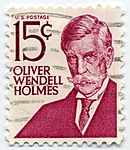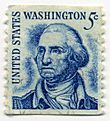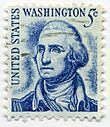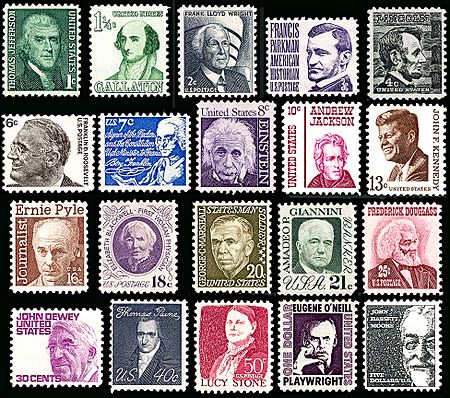Prominent Americans series facts for kids

Oliver Wendell Holmes, Jr., 15¢ stamp
|
|
The Prominent Americans series is a collection of definitive stamps. These are regular stamps used for everyday mail, unlike special commemorative stamps. The United States Post Office Department (and later the United States Postal Service) released these stamps between 1965 and 1978.
Contents
What Made This Stamp Series Special?
This series replaced an older set of stamps from 1954 called the Liberty Issue. By the mid-1960s, the old stamps felt a bit outdated, especially because they mostly showed political leaders. The Prominent Americans series was different! It was the first time that Benjamin Franklin, a very famous figure, wasn't on one of the lowest-priced stamps.
Celebrating Diverse Americans
The new stamps featured people from many different areas of life. Each person had their own unique picture style, drawn by a different artist. This was a big change, showing a desire for more variety. It was a step away from how past stamp series looked very similar.
A Step Towards Equality
This series also made history by including more women and the first African-American on a definitive stamp.
- Women on stamps: Two women, Elizabeth Blackwell and Lucy Stone, were featured. Before this, no regular stamp set had more than one important woman.
- African-American on stamps: Frederick Douglass, a famous abolitionist, was honored on the 25¢ stamp. This was the first time an African-American appeared on a regular U.S. stamp.
When Were the Stamps Released?
The stamps came out one by one, starting in 1965. Most of the main designs were released by 1968. Later, some stamps got special "tagged" versions, which helped machines sort mail. In 1978, new versions for coil (rolls of stamps) and booklet (small books of stamps) were made for the 15¢ stamp. This happened because the price to mail a letter changed.
The "Dirty Face" Washington Stamp
One interesting stamp was the 5¢ George Washington stamp. When it first came out in February 1966, the lower part of Washington's face looked too dark. People even called it the "dirty face" or "unshaven" Washington! Because of this, a lighter, clearer version of the stamp was released in November 1967.
Who Was on the Prominent American Stamps?
Here are some of the famous people featured in this special stamp series:
- 1¢ green - Thomas Jefferson, the third President of the United States.
- 1¼¢ light green - Albert Gallatin, a former Secretary of the Treasury and founder of New York University.
- 2¢ dark blue gray - Frank Lloyd Wright, a famous architect, shown with his design for the Guggenheim Museum.
- 3¢ violet - Francis Parkman, a well-known historian.
- 4¢ black - Abraham Lincoln, the 16th President of the United States.
- 5¢ blue - George Washington, the first President of the United States.
- 6¢ gray brown - Franklin D. Roosevelt, the 32nd President of the United States.
- 6¢ dark blue gray - Dwight D. Eisenhower, the 34th President of the United States.
- 7¢ bright blue - Benjamin Franklin, a politician, inventor, and the first U.S. Postmaster General.
- 8¢ violet - Albert Einstein, a brilliant physicist.
- 8¢ black, red blue gray (sheet) - Dwight D. Eisenhower.
- 8¢ claret (coil and booklet) - Dwight D. Eisenhower.
- 10¢ lilac - Andrew Jackson, the seventh President of the United States.
- 12¢ black - Henry Ford, who founded Ford Motor Company, shown with the Ford Model T car.
- 13¢ brown - John F. Kennedy, the 35th President of the United States.
- 14¢ gray brown - Fiorello LaGuardia, a popular Mayor of New York City.
- 15¢ claret - Oliver Wendell Holmes, Jr., a Supreme Court Justice.
- 16¢ light brown - Ernie Pyle, a famous World War II journalist.
- 18¢ purple - Elizabeth Blackwell, the first woman to earn a medical degree in the U.S.
- 20¢ olive - George C. Marshall, a top military leader and Secretary of State.
- 21¢ olive - Amadeo Giannini, who founded the Bank of America.
- 25¢ rose lake - Frederick Douglass, an abolitionist (someone who worked to end slavery), writer, and speaker.
- 30¢ reddish lilac - John Dewey, a reformer in education, philosopher, and psychologist.
- 40¢ bluish black - Thomas Paine, a political writer and activist.
- 50¢ magenta - Lucy Stone, an abolitionist and suffragist (someone who fought for women's right to vote).
- $1 dull purple - Eugene O'Neill, a famous playwright who won the Nobel Prize in Literature.
- $5 gray black - John Bassett Moore, a respected judge.
 | Toni Morrison |
 | Barack Obama |
 | Martin Luther King Jr. |
 | Ralph Bunche |




